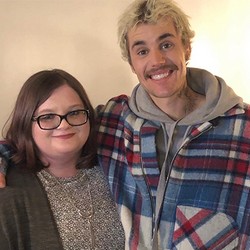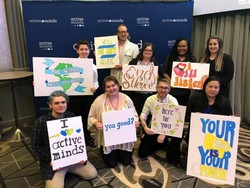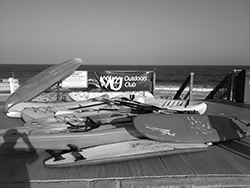The Monmouth University chapter of Active Minds, a non-profit organization, is dedicated to bringing its mission to Monmouth’s campus: to promote mental health awareness for college students.
The club began in 2013 as a co-sponsorship between the School of Social Work and Counseling and Psychological Services (CPS). The School of Social Work received a Garret Lee Smith Campus Suicide Prevention Grant, which encouraged a club on campus related to mental health and peer education. Now, in 2021, after a period of dwindling membership, the current student leaders are determined to revive the club.
Julie Coker, President of Active Minds and a graduate student of social work, is extremely passionate about the organization’s mission to reduce the stigma around mental health. Previously, she served as president of the Stockton University chapter during her undergraduate career, being drawn to the club due to a history of mental health. “I was already an advocate for mental health and excited that Active Minds was on my undergrad campus,” Coker said. “It changed my life since then.”
In February 2020, Justin Bieber awarded Coker with a $100,000 check on MTV for her work with Active Minds. The pop singer also released his 2020 single “Lonely” through a partnership with the organization.
Now, as president of Monmouth’s chapter, Coker is hoping to bring mental health advocacy to campus. Because the COVID-19 pandemic has limited in-person activities, the club is conducting weekly Zoom meetings every Thursday at 7 p.m. Coker is optimistic to resume in-person meetings after the pandemic.
Antonio Pugliese, a sophomore exercise and health science student and Vice President of Active Minds, has a history with mental health, which drew him to the club. “I have a past with anxiety and depression, and people around me have a past with it, so when I came to Monmouth I wanted to get involved in clubs I have passion for and that are a part of me,” he said.
Christopher Mckittrick, Assistant Director of Counseling & Psychological Services, and Advisor of Active Minds, said, “I’m a licensed counselor, so mental health is my passion; it’s my job. I’ve always been fascinated about openness to counseling and breaking down any stigma related to mental health.”
Now, as the COVID-19 pandemic drags on, college students are struggling like never before. According to the Centers for Disease Control and Prevention (CDC), young adults in the US reported worsened mental health outcomes, increased substance use, and elevated suicidal thoughts during the pandemic.
“Mental health and depression have been on the rise since being so isolated,” Coker said. “Therapists and practitioners are in a crisis because now there’s so many people that are looking for mental health services. Positively, Active Minds educates people that might be fearful of reaching out for support.”
“I’m not the biggest fan when people say to worry about your mental health now because of COVID,” Pugliese added. “I think it should be a big deal 24/7. But I do think that regardless of how difficult the pandemic has been, it definitely brought to life that we should value mental health.”
Both Coker and Pugliese are passionate about maintaining a role in mental health advocacy after graduation. While Coker is planning on becoming a therapist, she is also interested in working full-time with Active Minds on the national level. As for Pugliese, whether he pursues athletic training or physical therapy after graduation, he is committed to emphasizing the link between mental and physical education.
To continue the legacy and mission of the club at Monmouth, Coker and Pugliese are seeking interested members, especially those who are open to leadership positions.
 “When we have more students back on campus, that’s when there’s going to be more opportunities to connect people to supportive services, whether it’s at counseling services or informal peer support where you really feel a sense of belonging and connection to one another and the campus community,” Mckittrick added. “Those are huge protective factors. If we feel like we belong, we feel more able to respond and be resilient to things that are thrown to us. If we can help reduce the stigma and increase the health and resilience of the campus, I think that is the true payout of the club.”
“When we have more students back on campus, that’s when there’s going to be more opportunities to connect people to supportive services, whether it’s at counseling services or informal peer support where you really feel a sense of belonging and connection to one another and the campus community,” Mckittrick added. “Those are huge protective factors. If we feel like we belong, we feel more able to respond and be resilient to things that are thrown to us. If we can help reduce the stigma and increase the health and resilience of the campus, I think that is the true payout of the club.”
IMAGES TAKEN from Stockton University
PHOTO COURTESY of Julie Coker



